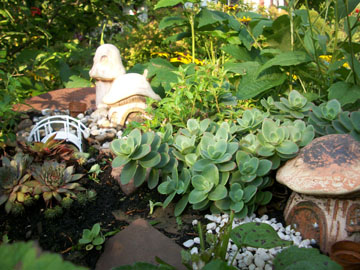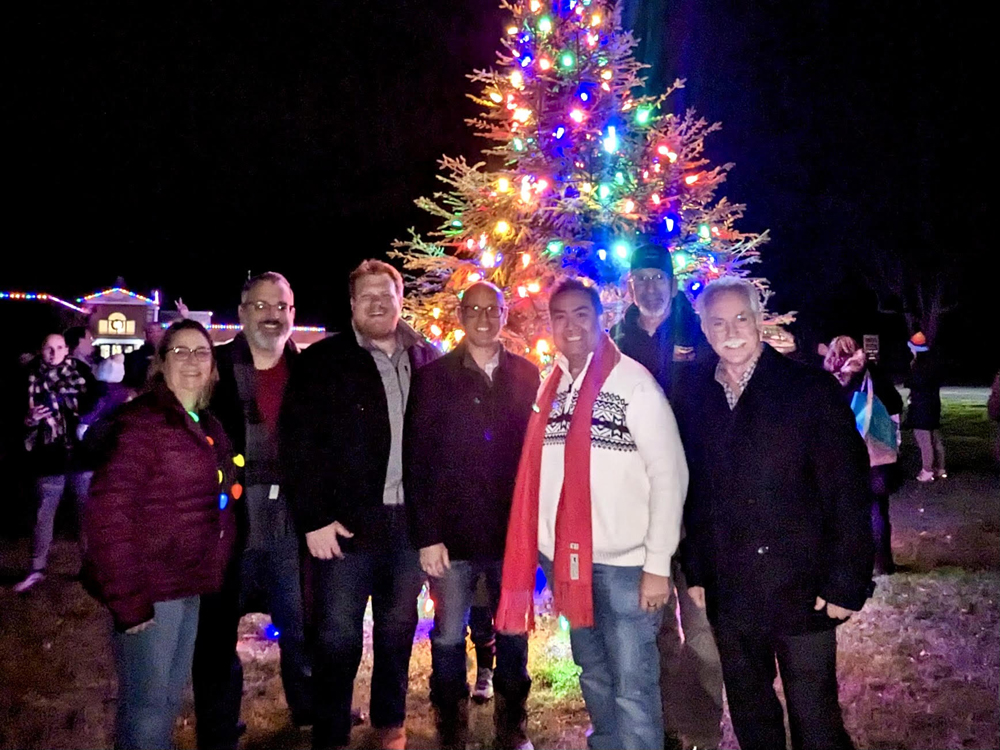Mini enchanted world full of garden charm
by Kristina Gabalski
 A mini garden can start out with only a few elements and can grow into a detailed display over time. This one is column writer Kristina Gabalski’s mini garden in progress.Fairy gardens are growing in popularity and it’s easy to understand why – the miniature gardens are full of charm – from teeny-tiny accessories, to figurines, to itty-bitty plants, they allow you to create your own little enchanted world.
A mini garden can start out with only a few elements and can grow into a detailed display over time. This one is column writer Kristina Gabalski’s mini garden in progress.Fairy gardens are growing in popularity and it’s easy to understand why – the miniature gardens are full of charm – from teeny-tiny accessories, to figurines, to itty-bitty plants, they allow you to create your own little enchanted world.
I’ve had the beginnings of a miniature/fairy garden started for several years. It is situated in an old wheelbarrow underneath a crabapple tree in the flowerbed surrounding my garden shed. It’s almost hidden now that the perennials in the bed have grown up around it. There are two ceramic mushroom “houses” surrounded by pebble paths and two succulent plants. A rudbeckia is growing and I planted two annual cigar plants to make a landscape. Some moss is growing along one edge as the garden is in partial shade and I have a small chunk of raw quartz from trip to North Carolina set in one corner. I would like to work towards creating a more detailed scene with accessories and additional plants. I don’t know if it will be a fairy garden, gnome garden, angel garden or just a miniature garden.
The basics for creating a miniature or fairy garden in a container are really not much different from creating any container garden – make sure you have drainage and good potting soil and then you can just let your imagination run wild. Pea-sized stones and gravel can be turned into walkways, small bowls into ponds and pint-sized plants into a landscape.
Garden centers now have accessories and plants available for miniature and fairy gardens including houses and other buildings, fairy and gnome figurines, fences, bridges, arbors, windmills, and furniture – just try to stick to a particular scale when choosing accessories to give your scene a real life appearance.
I visited Sara’s Garden Center in Brockport recently where there is a large selection of accessories, plants and even kits for creating fairy gardens. They also have ready-made fairy gardens for sale and for inspiration.
I purchased a bridge and two tiny metal flower pots. I also purchased a dwarf variety of Japanese Hinoki called “Dainty Doll.” It has leaves that are somewhat spiraled and pointed at the tips – wonderful texture to add to the miniature garden.
Many different plants work well in a miniature/fairy garden including succulents and dainty herbs like thyme and chamomile, creeping Jenny and miniature hostas. Dwarf cypress and bonsai are other possibilities. You can prune your plants as they grow to keep them in check.
Take care watering your container fairy garden so you don’t cause damage. It’s best to situate your miniature garden in a somewhat protected location that gets morning sun and afternoon shade.
The possibilities for what container to use for your miniature/fairy garden are endless, and can add tons of charm to the garden – old galvanized pails, wagons, wooden boxes, tubs. Containers with an aged look are especially appropriate and if you have broken terra cotta pots or other pottery, those can be incorporated, as well.
And you don’t have to limit yourself to containers when it comes to miniature/ fairy gardens. Think outside the container and incorporate a miniature garden scene into your larger garden landscape.
Again, it’s good to pick a spot that is sheltered from the harsh elements and gets some shade (helpful in making that moss grow). It’s great if you have some large rocks or an old tree stump or log to incorporate into your garden and you can create a water feature with a small, natural-shaped pond liner. Start with the larger plants and then fill in with smaller ones to create your mini-landscape.
Accessorizing possibilities are limited only by your imagination. If you are crafty and creative you could even make your own furniture or accessories from twigs or buildings from wood scraps or small branches. You can even change your accessories to reflect seasonal changes and holidays. I grow spinning gourds, some of which are so tiny they can be incorporated into miniature scenes – we use them for doll play and things like our Christmas Creche as they dry especially easily.
I think one of the nicest things about miniature/fairy gardens is that they are also fascinating to children. Creating and maintaining a miniature/fairy garden is a great project to complete with your children or grandchildren. A miniature garden can also be a setting for hours of outdoor imaginative play – simply create a fun setting with pea gravel roadways, buildings, furniture, accessories and sturdy little plants for play with small toy trucks or dolls.
They may be tiny, but there is no limit to the fun you can have with a miniature garden.




